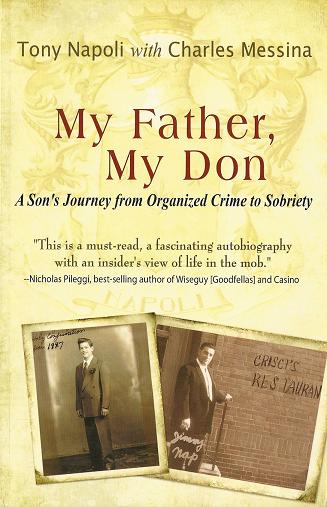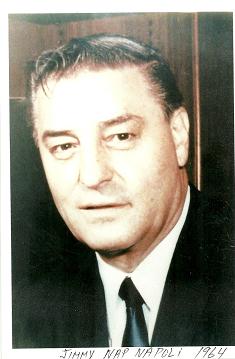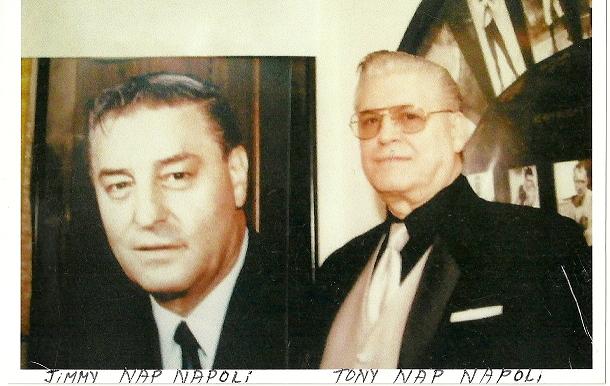
Recently we published a review on the popular book “My Father, My Don,” A Son’s Journey from Organized Crime to Sobriety, and we are now pleased to offer our readers an interview to the author, Tony Napoli.
L’Idea: What made you decide to write this book?
Tony Napoli: I decided to write this book with the encouragement from my mother and other family member’s when I was 26 years old; that was 52 years ago. As I got older, I gathered more and more material and I outlived most of the characters mentioned in my book. When I decided I had enough material, I hired a co-writer to help me put all my excerpts of about a 1,000 pages, into story form. My book was released on Sept.18th 2008, when I was 73 years old.
L’Idea: When you were seventeen, you were approached by the Boston Braves to play in the summer time for one of their Minor League Clubs. Your mother said “No way” because she did not want you far from home. You also were training for the US Air Force boxing team and there were talks about participating to the 1956 Olympics. This time it was your father who intervened and said “No”; and that was it. This is all recorded in the chapter titled “The road not taken”. Do you feel regrets for not pursuing those dreams? Were you ever even tempted to disobey or at least try to convince your parents? Do you believe your parents were justified in their requests? If so, why?
Tony Napoli: My father never said NO to my boxing as an Amateur in the Golden Gloves and on the Air Force boxing team. He said NO after I was Honorably Discharged from the US Air Force and I wanted to turn Pro as a Boxer. He said I was management material, and he only wanted me to learn the art of self-defense to protect myself in the streets of Brooklyn. He also felt that a strong mind needs a strong body to accomplish and get things done the right way. I continuously disobeyed my parents when they tried to make decisions for my future. I loved my mother dearly and I listened to her when she asked me not to travel with the Boston Braves Minor league Baseball team in the summer time when school was out, because I was only 17 years old and I didn’t want her to worry about me traveling across the country on a broken down bus.
 L’Idea: You name quite a few entertainers who you had the opportunity to meet, for good or bad reasons. Who was the one who impressed you the most and why?
L’Idea: You name quite a few entertainers who you had the opportunity to meet, for good or bad reasons. Who was the one who impressed you the most and why?
Tony Napoli: The entertainer I was most impressed with was Frank Sinatra. I liked the way he hired former athletes to travel with him. He made them earn a living in an honest way by putting them on his payroll and use it as a tax write-off. They traveled all over the world with him, not only as bodyguards, but mostly as close friends who had no other way of making a living due to their lack of education. I became Sinatra’s drinking partner on many occasions, especially when he entertained at Caesar’s Palace, in Las Vegas, Nevada. I was a Casino Host in charge of entertainment at the time. Frank was very generous with people he was close to. He never wanted to get close to strangers. He was very rude to those who tried to overpower him with autographs. He had his men get the names and address of his fans who wanted his autographed picture. He’d rather mail them a picture with his autograph when he spent time alone in his room. He always traveled with a bookkeeper. As a matter of fact the last wife he was married to, Barbara Marx, was also his bookkeeper before he married her. Frank was also an Amateur boxer before he became a singing star.
L’Idea: What was, in your opinion, the difference in style between Frank Sinatra and Jimmy Roselli?
Tony Napoli: Frank Sinatra, whose birth name was Francis Sinestra, was flamboyant, with great magnetism in public and on the stage. Jimmy Roselli, whose birth name was Michael Roselli, first worked for me when I was 24 years old. My father bought me a night club in Union City, New Jersey in 1959. The name of the club was “The Club Rag Doll.” I paid him $300.00 to sing on weekends. His very first song was “I’m Alone Because I Love You.” I was supposed to go to contract with him and be his manager. My father put a stop to that immediately when Roselli asked for a loan to cover his part of the deal. Before Roselli died, he called me from his home in Clearwater, Florida. He read my book, I mentioned him in Chapter 17. He remembered the night I was locked up after working over that crooked cop; Roselli was singing on my stage the night it happened. He complimented me for pulling no punches and giving the reader everything in detail the way it happened. Roselli was very independent when it came to promoting himself. He never reached the level of stardom like Sinatra because he wouldn’t cooperate with the Wise guys; and, in those days you had to deal with the Wise guys, to get anyplace in show business. The Wise guys were behind all the top clubs and were very influential with Hollywood Producers, The Wise guys controlled the union (SAG) Screen Actors Guild. If you wanted to get high paid jobs as an entertainer, you had better cooperated with the Big Guys.

L’Idea: Why was your father’s nickname “The torpedo?”
Tony Napoli: When my Father was a young teenager, he was the leader of a neighborhood gang called “The Lorimer Street Boys” In those days there was a Gang in almost every Italian and Irish neighborhood, in the Brooklyn area. The Lorimer Street Gang was located in the Williamsburg section of Brooklyn. To be the leader of a gang you had to fight and beat up the leaders of the other gangs. About three nights a week, boxing trainers used to put on boxing shows at the old Military Armories that were built during World War One for Military training. Folding chairs were used for seating arrangements. They would hold up to 1,000 people in the Armories. The gang leaders would fight against each other. If one gang didn’t like the decision, they would throw the folding chairs into the air to show their disagreement with the official scorer (the referee). When my Father (Jimmy Nap) fought, he always knocked his opponent out with a straight right hand. That’s how he got the nickname “Torpedo.”
L’Idea: You present your father as a perfect gentleman, a great father and at the same time an assassin and a made man. How do you feel that can be possible and how does a person involved in such a complicated life manages to retain his human side?
Tony Napoli: When my father was a young man, at between 16 and 20 years old, he wanted to be like the guys who were always dressed up in suits and ties, wearing Fedora hats. He didn’t want to work as a bricklayer like his father was. As he grew older, he managed to get involved with the Wise guys by being one of their collectors and becoming a strike buster to discourage laborers not to strike by using bats and crowbars to beat them with. He worked for the companies who didn’t want to have their men striking. It was at a young age when he was considered an assassin and a bully. After getting out of jail in 1945, when he was 34 years old, he came back to my mother and turned over a new leaf. My mother took him back because he showed her a sense of responsibility to support the family. He got involved in the Numbers racket, which in those days was considered non-violent as a business. She saw him get respect from clean-cut-looking men; some he met in jail. My mother was only concerned about keeping the family together. She allowed my father to travel all over the country to do his business for all five organized crime families in the New York Area. My mother was not familiar with that part of my father’s life. She only saw in him a business man earning money, and lots of it, for people he called investors. At 34 years old my father was considered by those men in his way of life a standup guy with respect, integrity, dignity and honor. A man they could count on to give them a fair shake from their investments in his gambling enterprises all over the country. My father changed his ways from being a bully and Assassin for love of his immediate family and a great love for my mother, like I changed my ways from being a bully and Alcoholic when I found Sobriety.
L’Idea: In one of your chapters you seem to show a lot of anger at Giuliani. Could you explain why it is so?
Tony Napoli: In Chapter 27 of my book, I denounce Rudy Giuliani as a hypocrite. He tried to get me to talk against my father in the way he makes a living, knowing that his Uncle was Mob connected. Giuliani convinced President Reagan to send him to the New York Area as a US Marshall to infiltrate into the five Organized Crime families. By doing so, he was to be considered a crime buster, when all the while Giuliani was politically minded. He wanted to show the Government he would even lock up his own mother and father if he had to, and gain recognition as a future GOP candidate for a high elective office, with the backing of the Republic party, and gain the NY votes when he finally decided the right time to run for Mayor. Giuliani is Sicilian, and most of his relatives came from the Sicilian Mafia in Sicily. When I was indicted in 1985 on the RICO act and Giuliani was the US Attorney, the key witness against me in court told the jury that he was one of the gang that shot and killed a federal judge in Texas. He was sentenced to life in prison in Lewisburg Penitentiary, in Pennsylvania. He said that Rudy Giuliani offered him $30,000.00 to testify against me and he would get a reduced sentence. I was finally acquitted and when I was walking out of the courtroom, Giuliani said to me “I’ll get you the next time, Napoli” I thought how can he possibly make such an outrageous deal with a scumbag who killed a federal Judge just to put me away for gambling. I was facing 25 years in jail before I was acquitted.
L’Idea: There is a movie being produced on your book. Could you tell us something about that?
Tony Napoli: The movie you talk about is called a 20 minute short. About 50 hours of shooting 32 scenes. This pilot was made by me, I paid all expenses so I can present it to the film people in the Film Festivals all over the country. It shows the Highlights of my story played out with real actors who play the main characters in my book. It will also be presented to potential investors leading up to a feature film or TV series. The filmmaker I hired is Hussain Ahmed, from Iraq. He’s also the Director and makes his home in Louisville, Kentucky.
L’Idea: You now have a lot of activities, which you defined as “giving back to society”. Could you tell us what they are?
Tony Napoli: For the past 19 years I’ve been a Veterans Advocate, helping disabled veterans with compensation for their service-connected injuries. I’m also a recovering alcoholic helping other alcoholics find sobriety like I did nineteen years ago, when I left the Mob life behind me. I also help indigent boxers with their medications, when they can’t afford it because they retired from boxing with brain and physical injuries and unable to work to support their selves. The spirit of my father lives on through me.







